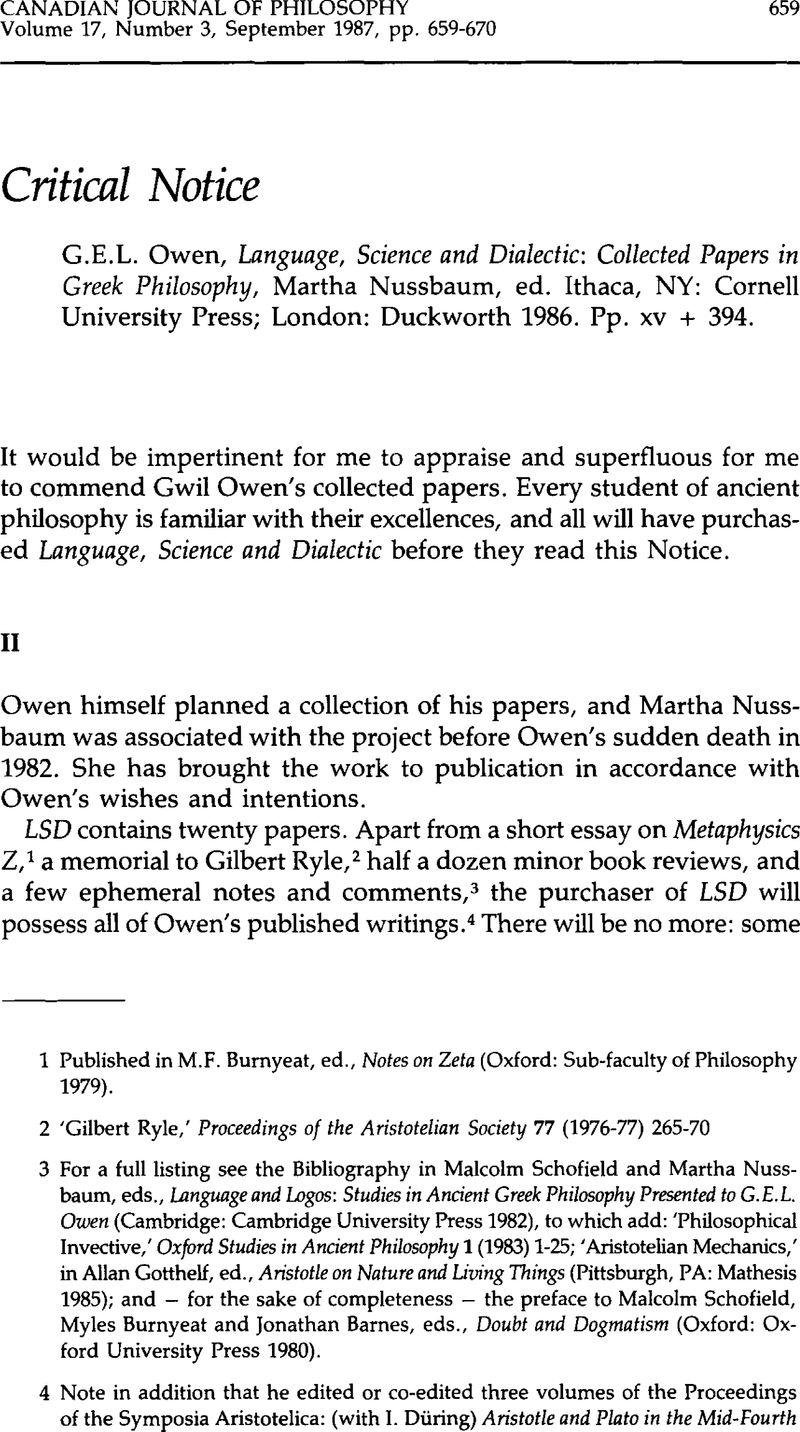No CrossRef data available.
Article contents
G.E.L. Owen, Language, Science and Dialectic: Collected Papers in Greek Philosophy, Martha Nussbaum, ed. Ithaca, NY: Cornell University Press; London: Duckworth 1986. Pp. xv + 394.
Published online by Cambridge University Press: 01 January 2020
Abstract

- Type
- Critical Notice
- Information
- Copyright
- Copyright © The Authors 1987
References
1 Published in Burnyeat, M.F. ed., Notes on Zeta (Oxford: Sub-faculty of Philosophy 1979)Google Scholar.
2 ‘Ryle, Gilbert’ Proceedings of the Aristotelian Society 77 (1976-77) 265–70Google Scholar
3 For a full listing see the Bibliography in Schofield, Malcolm and Nussbaum, Martha eds., Language and Logos: Studies in Ancient Greek Philosophy Presented to G.E.L. Owen (Cambridge: Cambridge University Press 1982)CrossRefGoogle Scholar, to which add: ‘Philosophical Invective,’ Oxford Studies in Ancient Philosophy 1 (1983) 1-25; ‘Aristotelian Mechanics,’ in Gotthelf, Allan ed., Aristotle on Nature and Living Things (Pittsburgh, PA: Mathesis 1985)Google Scholar; and - for the sake of completeness - the preface to Schofield, Malcolm Burnyeat, Myles and Barnes, Jonathan eds., Doubt and Dogmatism (Oxford: Oxford University Press 1980)Google Scholar.
4 Note in addition that he edited or co-edited three volumes of the Proceedings of the Symposia Aristotelica: (with Düring, I.) Aristotle and Plato in the Mid-Fourth Century (Göteborg: Almqvist & Wiksell 1960)Google Scholar; Aristotle on Dialectic: The Topics (Oxford: Oxford University Press 1968); (with Lloyd, G.E.R.) Aristotle on Mind and the Senses (Cambridge: Cambridge University Press 1978)Google Scholar.
5 A pupil once confessed to me that he found Richard Robinson's Atheist's Values dull. I was astonished; for I have always savoured the pale, dry, sharp elegance of Robinson's prose. But when I read his text, I hear his voice: my pupils do not.
6 Owen ‘planned to add a long footnote discussing recent stylometric work’ on Plato (LSD, ix). Such a discussion is still needed: as Leonard Brandwood showed, in his unpublished thesis of 1958, the numerous statistical studies of Plato are almost all worthless.
7 The title is absurdly modest, and also misleading: the ‘Notes’ in fact constitute an extended analysis of the main structural features of the second part of the Parmenides.
8 An Italian colleague has insisted to me that unless he publishes in English few scholars - and no students - will trouble to read his work. I do not think that anglophonia is the only disease of its kind: learned doctors in Paris assure me that in France francophonia is increasing in virulence.
9 The obituary appeared in the Annual Report of King's College, Cambridge, for 1983: I am most grateful to Geoffrey Lloyd for letting me have a copy. Similar sentiments are expressed in the Preface to Schofield-Nussbaum, Language and Logos.
10 ‘Particular and General,’ Proceedings of the Aristotelian Society 79 (1978-79) 1-21, at pp. 1-2; also in LSD, 279.
11 In ‘Aristotle: Method, Physics, and Cosmology’ (1970) and ‘Aristotelian Mechanics’ (1985), Chapters 8 and 18 of LSD.
12 ‘Plato and Parmenides on the Timeless Present’ (1966); LSD, 35
13 Sec Owen's comments on pp. 349ff of LSD, in ‘Philosophical Invective’ (1983).
14 See LSD, 152, in ‘Aristotle: Method, Physics, and Cosmology’ (1970).
15 I quote from p. 204 of Günther Patzig's stirring and chilling essay on ‘irrationalistic interpretation of Greek philosophy in twentieth-century Germany’: ‘Furchtbare Abstraktionen,’ in Rudolf von Thadden, ed., Die Krise des Liberalismus zwischen Weltkriegen (Gottingen: Vandenhoek & Ruprecht 1978).
16 See Patzig, ‘Abstraktionen,’ 203-6 - and note the sinister context in which Jaeger's work is set. I may add that, like Patzig, I regard Jaeger's earlier Studien zur Entstehungsgeschichte der Metaphysik des Aristoteles (Berlin: Weidmann 1912) as a remarkable and invaluable piece of scholarship: a pity that Aristotle rather than the Studien engaged the attention of the scholarly public.
17 See the Ryle necrology (above, n.2); ‘Notes on Ryle's Plato,’ esp. p. 85 of LSD; and p. 34 of the anonymous obituary.
18 See e.g. Patzig, ‘Abstraktionen,’ 194-5.
19 It may not be superfluous to add that in stressing the importance of philosophy Owen did not downgrade the role of philological scholarship. Nor is it true that Jaeger's Aristotle is a work of philology rather than of philosophy. In philology no less than in philosophy Owen's best papers stand far above Jaeger's Aristotle.
20 Ackrill, J. L. ‘Gwilym Ellis Lane Owen,’ Proceedings of the British Academy 70 (1984) 481–99, at p. 487Google Scholar
21 I have just been reading Ioppolo's, Anna Maria Opinione e Scienza (Naples: Bibliopolis 1986)Google Scholar. The book's subtitle is ‘II dibattito tra Stoici e Accademici nel III e nel II secolo a.C.,’ and Ioppolo takes - with sophistication and success - a thoroughly ‘dialectical’ approach to the subject. I cite this example to show that there is nothing insular or parochial about the Rylean attitude to the study of ancient philosophy.




